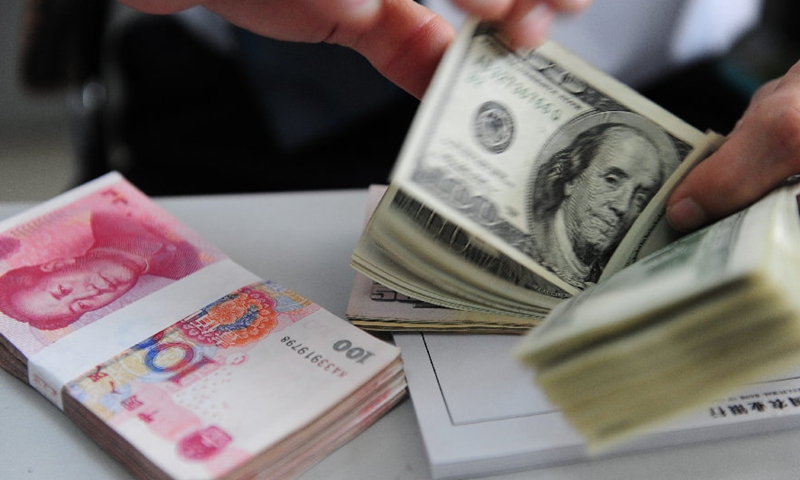
A teller counts U.S. dollar bills at a bank in Qionghai, south China's Hainan Province.Photo:Xinhua
China, the second-largest holder of US Treasury bonds, cut its holdings for a fourth consecutive month in July to $821.8 billion, a 14-year low, data from the US Treasury Department showed on Monday local time.
The move was not unexpected in either strategic or financial terms, experts said, citing the growing uncertainties of the US economy, which is widely anticipated to enter a recession in 2024, and the longer-term weakening of the US dollar as more countries seek currency diversification.
China has kept its Treasury holdings under $1 trillion since April 2022. Holdings were cut from August 2022 to February 2023, with a slight pick-up in March of $20.3 billion, before falling again in April, according to media reports.
Japan, the largest holder, increased its holdings in July to $1.112 trillion, up $6.9 billion from June. The UK remained the third-largest holder with $662.4 billion.
The total in July of all net foreign acquisitions of long-term securities, short-term US securities and banking flows reached $140.6 billion. Of this, net foreign private inflows were $149.4 billion, and net foreign official outflows were $8.8 billion, read a statement by the US Treasury Department on Monday.
Dong Shaopeng, a senior research fellow at the Chongyang Institute for Financial Studies at the Renmin University of China, told the Global Times on Tuesday that China's continuous reduction was a long-term strategy, reflecting a bleak outlook for the US economy, which might enter a recession next year as well as the long-term falling dominance of the dollar.
"Geopolitical tensions are another factor," Dong said.
Recent US data show moderate growth and short-term resilience.
US producer prices rose 0.7 percent in August, after rising 0.4 percent in July. Retail sales climbed 0.6 percent last month, a slightly faster pace than July's revised 0.5 percent gain, and marking the fifth straight month of growth.
"However, the improvement of economic data in the short term does not mean that the US economy will achieve a 'soft landing' as it still faces many disturbing factors," Chen Li, chief economist of Chuancai Securities, told the Global Times on Tuesday.
US gross national debt exceeded $33 trillion for the first time on Monday, according to the Treasury Department, a fiscal challenge to the country's economic future.
The US government faces another
possible federal shutdown after September 30, after earlier budgetary appropriations from the US Congress run out. The possible shutdown, after a debt ceiling crisis that rattled markets in the first half of 2023, clearly illustrated the increasingly hostile political environment in the US, and the growing partisan rivalry and confrontation will have serious consequences for the US and other major economies, analysts said.
Washington's currency policy also carries uncertainties that could exacerbate its economic woes.
Though there is a high probability that the Federal Reserve will suspend raising interest rates in September, many Fed officials have recently released tightening signals.
"Uncertainty about the Fed's future monetary policy has increased, which has disturbed the US Treasury market, and thus it might affect the value of China's foreign exchange reserves," Chen said.
The two-day Federal Open Market Committee meeting begins on Tuesday local time and its outcome is due on Wednesday. The US Fed has been raising rates since March 2022 and this could be the second time since then that the Fed may maintain a pause on interest rate hikes.
China's reduction of its US Treasury bond holdings will not have an impact on China's foreign exchange reserves.
Data from the State Administration of Foreign Exchange showed that China's foreign exchange reserves in July were $3.2043 trillion, an increase of 0.35 percent from June, having been on the rise for two consecutive months.




